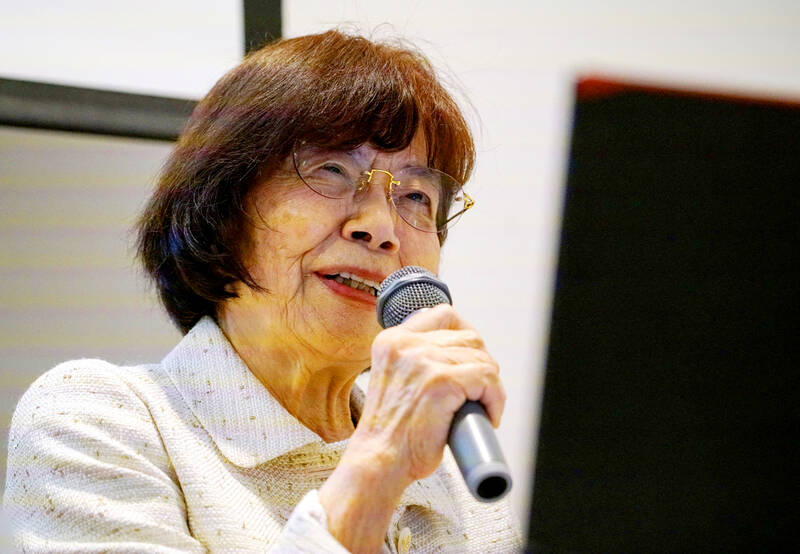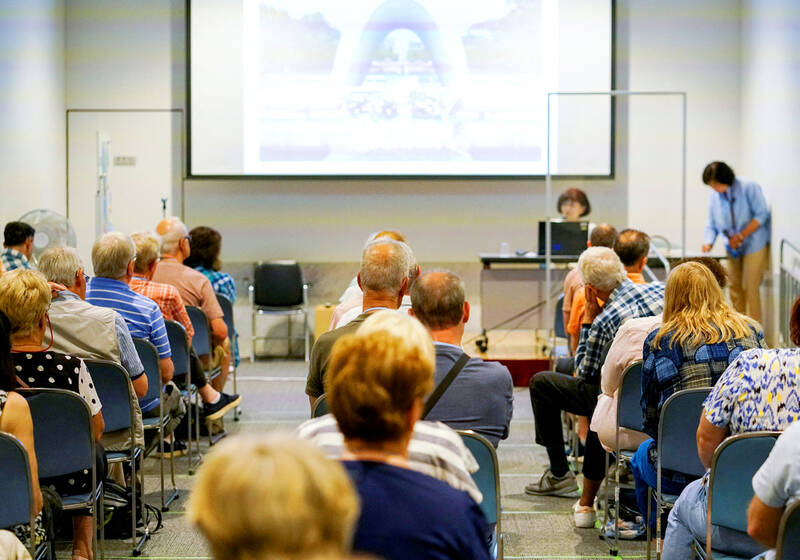Standing at the front of a dimly lit room in the basement of the Hiroshima Peace Memorial Museum, Teruko Yahata’s voice broke as she recalled the morning her world changed, on Aug. 6, 1945.
“All of a sudden, the entire sky flashed and was illuminated in bluish-white, as if the heavens had become one huge, fluorescent light,” the 85-year-old, speaking in English, told an audience of British tourists on a recent Tuesday.
“I immediately fell to the ground and lost consciousness.”

Photo: Reuters
Yahata is a hibakusha, a survivor of the atomic bomb dropped on the city of Hiroshima by the US. The bomb killed tens of thousands instantly; scores more suffered long-lasting injuries.
While talks by hibakusha have become a regular feature of the city’s memorial sites, Yahata stands out for her presentations in English.
Yahata, who was eight when she witnessed the nuclear destruction of her hometown, started traveling the world in 2013 to tell her story through an interpreter, but felt the experience lacking.

Photo: Reuters
“I had this vague dream of learning English so that I would be able to communicate in my own words, in my own voice, the dreadful power of that horrific atomic bomb and bring to life my own experience of that tragic, miserable scene, and sorrow,” she said, speaking in Japanese.
Resolving to learn English, she began taking classes at the YMCA as she headed into her 80s, and by 2021, was giving her presentations exclusively in English.
Yahata’s presentation is from a script translated by her English teacher, which she rehearses by reading along to a recording made by a native speaker. The script is covered in notes and prompts on correct pronunciation and intonation.
Yahata’s English ability is mostly limited to reading the script, but the impact of her spoken words on the audience is undeniable, moving some to tears.
“It feels very real still, when she speaks; she brings it like it’s happening today. She makes you feel that way,” said Briton Denise Hickson, visiting from Bristol.
Japanese Prime Minister Fumio Kishida is hosting the G7 summit in Hiroshima, his home constituency, starting on Friday. He is expected to give his guests a tour of the peace memorial and have them meet with atomic bomb survivors, as part of his efforts to convey a vision for a world free of nuclear weapons.
Although that vision seems more distant now with Russia threatening to resume nuclear tests and neighboring North Korea developing its own nuclear arsenal, Yahata’s expectations for G7 leaders are lofty.
“I want the G7 leaders to bring with them the vision of abolishing nuclear weapons,” she said. “I don’t want them to just talk about ideals or release a written resolution. I want them to take the first concrete step.”

June 2 to June 8 Taiwan’s woodcutters believe that if they see even one speck of red in their cooked rice, no matter how small, an accident is going to happen. Peng Chin-tian (彭錦田) swears that this has proven to be true at every stop during his decades-long career in the logging industry. Along with mining, timber harvesting was once considered the most dangerous profession in Taiwan. Not only were mishaps common during all stages of processing, it was difficult to transport the injured to get medical treatment. Many died during the arduous journey. Peng recounts some of his accidents in

“Why does Taiwan identity decline?”a group of researchers lead by University of Nevada political scientist Austin Wang (王宏恩) asked in a recent paper. After all, it is not difficult to explain the rise in Taiwanese identity after the early 1990s. But no model predicted its decline during the 2016-2018 period, they say. After testing various alternative explanations, Wang et al argue that the fall-off in Taiwanese identity during that period is related to voter hedging based on the performance of the Democratic Progressive Party (DPP). Since the DPP is perceived as the guardian of Taiwan identity, when it performs well,

The Taiwan People’s Party (TPP) on May 18 held a rally in Taichung to mark the anniversary of President William Lai’s (賴清德) inauguration on May 20. The title of the rally could be loosely translated to “May 18 recall fraudulent goods” (518退貨ㄌㄨㄚˋ!). Unlike in English, where the terms are the same, “recall” (退貨) in this context refers to product recalls due to damaged, defective or fraudulent merchandise, not the political recalls (罷免) currently dominating the headlines. I attended the rally to determine if the impression was correct that the TPP under party Chairman Huang Kuo-Chang (黃國昌) had little of a

At Computex 2025, Nvidia CEO Jensen Huang (黃仁勳) urged the government to subsidize AI. “All schools in Taiwan must integrate AI into their curricula,” he declared. A few months earlier, he said, “If I were a student today, I’d immediately start using tools like ChatGPT, Gemini Pro and Grok to learn, write and accelerate my thinking.” Huang sees the AI-bullet train leaving the station. And as one of its drivers, he’s worried about youth not getting on board — bad for their careers, and bad for his workforce. As a semiconductor supply-chain powerhouse and AI hub wannabe, Taiwan is seeing